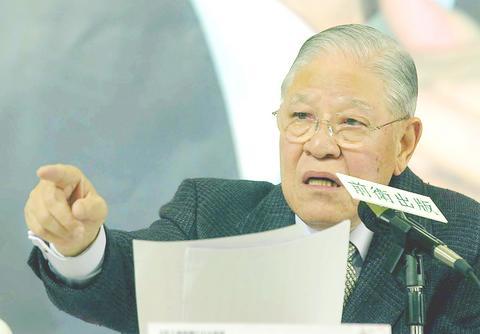Former president Lee Teng-hui (
Lee was speaking at an event to mark the release of the Chinese-language version of his book Bushido Kaidai (武士道解題), a commentary on the traditional samurai spirit.

PHOTO: CHIANG YING-YING, TAIPEI TIMES
Lee said this essential part of Japanese culture has been lost, resulting in Japan's appeasing China at the expense of Taiwan's interests.
"The old Japanese values of the samurai have long since disappeared and the Japanese have become weak. Whatever China opposes, Japan dare not say something different," Lee said.
"When China opposes Taiwan's referendum plan, Japan reacts in a fearful way and even allowed a low-ranking official of the Interchange Association [Japan's representative office in Taiwan] to secretly deliver the Japanese government's concerns."
Lashing out at Japan's bowing to pressure from China, Lee said, "The top authority of Japan may not act in an obvious way to make concessions to China, but lower-level government officials will then do something to appease China."
Lee was referring to a representative of the Interchange Association, Katsuhisa Uchida (內田勝久), who visited Presidential Office Secretary-General Chiou I-jen (邱義仁) late last month to express Tokyo's dissatisfaction with the referendum plan.
Lee said Japan will act against Taiwan as compensation for its policies that irritate China.
He said Japanese Prime Minister Junichiro Koizumi's visits to the Yasukuni shrine, a symbol of Japanese militarism and a focal point for China's anti-Japanese sentiment, and a recent visit to Taiwan by former prime minister Yoshiro Mori (森喜朗) are the main reasons why Japan is willing to grant China concessions.
Lee urged the Japanese people to restore the samurai value of honesty, adding the weakness and appeasement Japan has shown goes against the samurai spirit.
He also criticized Japan's vacillation, saying Japan's Constitution was based on the US Constitution -- the same situation Taiwan faces by using the Republic of China Constitution, which was drafted in China and brought to Taiwan in 1949.
At yesterday's book release, Lee urged the people of Taiwan to find their own cultural spirit. He called on people to insist on "Taiwan-centric" beliefs and to further efforts to build a Taiwanese identity.
The book was originally written in Japanese by Lee and was first published in Japan in 2002.
Born in Taiwan during the Japanese colonial era, the former president received a Japanese education for more than 20 years. His interpretation and observation for the book was inspired by Japanese pundit Nitobe Inazo, who completed Bushido, the Soul of Japan in 1900.

CHAOS: Iranians took to the streets playing celebratory music after reports of Khamenei’s death on Saturday, while mourners also gathered in Tehran yesterday Iranian Supreme Leader Ayatollah Ali Khamenei was killed in a major attack on Iran launched by Israel and the US, throwing the future of the Islamic republic into doubt and raising the risk of regional instability. Iranian state television and the state-run IRNA news agency announced the 86-year-old’s death early yesterday. US President Donald Trump said it gave Iranians their “greatest chance” to “take back” their country. The announcements came after a joint US and Israeli aerial bombardment that targeted Iranian military and governmental sites. Trump said the “heavy and pinpoint bombing” would continue through the week or as long

TRUST: The KMT said it respected the US’ timing and considerations, and hoped it would continue to honor its commitments to helping Taiwan bolster its defenses and deterrence US President Donald Trump is delaying a multibillion-dollar arms sale to Taiwan to ensure his visit to Beijing is successful, a New York Times report said. The weapons sales package has stalled in the US Department of State, the report said, citing US officials it did not identify. The White House has told agencies not to push forward ahead of Trump’s meeting with Chinese President Xi Jinping (習近平), it said. The two last month held a phone call to discuss trade and geopolitical flashpoints ahead of the summit. Xi raised the Taiwan issue and urged the US to handle arms sales to

State-run CPC Corp, Taiwan (CPC, 台灣中油) yesterday said that it had confirmed on Saturday night with its liquefied natural gas (LNG) and crude oil suppliers that shipments are proceeding as scheduled and that domestic supplies remain unaffected. The CPC yesterday announced the gasoline and diesel prices will rise by NT$0.2 and NT$0.4 per liter, respectively, starting Monday, citing Middle East tensions and blizzards in the eastern United States. CPC also iterated it has been reducing the proportion of crude oil imports from the Middle East and diversifying its supply sources in the past few years in response to geopolitical risks, expanding

Pro-democracy media tycoon Jimmy Lai’s (黎智英) fraud conviction and prison sentence were yesterday overturned by a Hong Kong court, in a surprise legal decision that comes soon after Lai was jailed for 20 years on a separate national security charge. Judges Jeremy Poon (潘兆初), Anthea Pang (彭寶琴) and Derek Pang (彭偉昌) said in the judgement that they allowed the appeal from Lai, and another defendant in the case, to proceed, as a lower court judge had “erred.” “The Court of Appeal gave them leave to appeal against their conviction, allowed their appeals, quashed the convictions and set aside the sentences,” the judges